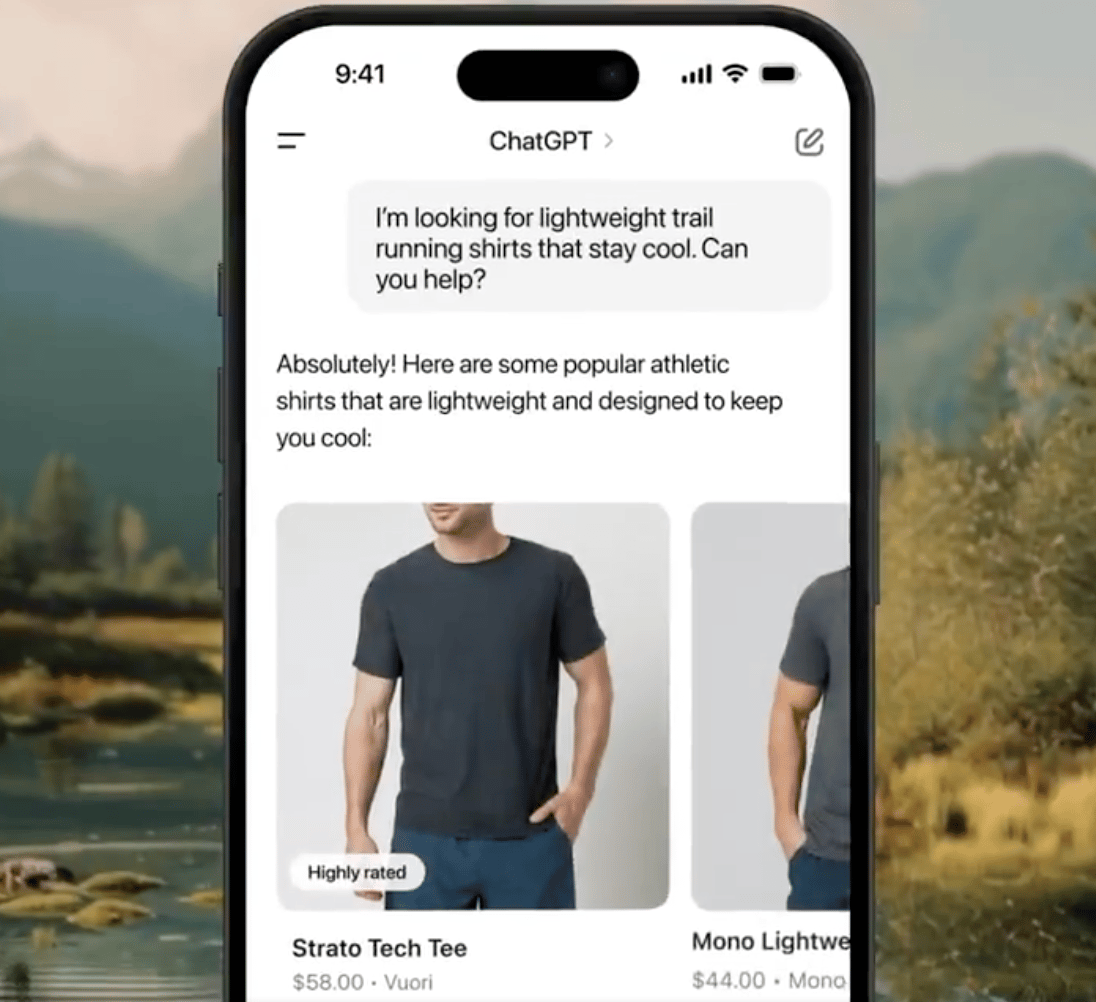
By Alex Murton | Read time: 5 mins
Hey, it’s Alex.
A big one for this week - shopping in Chat GPT is here, and Google isn’t going to take it lying down.
Let’s dig in.
🤖 GROW WITHOUT ADS
Change is here - act now
Yesterday marked a pivotal shift in ecommerce.
We all knew this was coming - but now it’s here - Shopify and OpenAI announced their partnership is live - allowing shoppers to discover and purchase products from Shopify merchants directly inside ChatGPT conversations removing layers of friction that have defined online shopping for decades.
For brands, this isn’t just another channel.
It’s the beginning of a new retail paradigm: where AI-driven conversations become a storefront.
What was announced
Shoppers can now browse, receive tailored suggestions, and complete purchases from Shopify stores without leaving ChatGPT.
The rollout begins with US shoppers, spotlighting leading brands like Glossier, Spanx, and Steve Madden.
Merchants maintain ownership of customer relationships, data, and fulfilment through Shopify’s system. The AI experience sits on top of Shopify’s infrastructure, meaning brands don’t sacrifice control.

Product results in chat GPT
Why this matters
AI chat is moving from curiosity to commerce driver. Instead of typing into a search bar or navigating endless product pages, consumers can now simply ask: “Show me the best organic skincare under $50.”
ChatGPT will surface Shopify products that fit the request, and the purchase can happen on the spot.
This shift has several implications:
Discovery is moving upstream: AI is becoming the first touchpoint for shopping.
Conversion paths are collapsing: the traditional funnel (search > browse > cart > checkout) is being compressed into a single interaction.
Indexation is the new battleground: if your products aren’t structured, optimised, and available to ChatGPT, they won’t appear.
Put simply: being the product ChatGPT suggests is becoming the new SEO.

How to get your Shopify store indexed in ChatGPT results
Brands should adapt quickly to ensure visibility in this new ecosystem. Practical steps include:
Structured product data: Ensure titles, descriptions, tags, pricing, and stock levels are clear and consistent. AI thrives on structured, machine-readable data.
Conversational content: Go beyond keywords. Write product descriptions and FAQs in a way that mirrors how real people ask questions.
Rich media and trust signals: High-quality images, verified reviews, and transparent policies help AI prioritize your store.
Technical SEO & schema: Implement JSON-LD schema, keep sitemaps updated, and ensure product feeds are clean.
AI commerce integrations: Watch Shopify’s dashboard and newsletters for official sign-up options to sync your catalog.
Real-time data accuracy: Stock and pricing mismatches erode trust with both AI and customers. Live updates are non-negotiable.
Strategic implications for brands
While Shopify’s announcement focused on technical integration, the broader implications for ecommerce are significant.
Brand voice matters more than ever: Because ChatGPT understands natural language, how your brand communicates on-site and in product copy can influence visibility in recommendations.
Product-market clarity is critical: AI matches shopper intent with product relevance. If your brand positioning is vague, your products may not surface.
Competition is shifting: Instead of competing only for ad spend or search rankings, brands are now competing for placement within AI-powered answers.
For lifestyle brands, this presents both a challenge and an opportunity. Done right, being indexed in ChatGPT isn’t just traffic - it’s highly qualified, purchase-ready customers delivered at the exact moment of intent.
🤺 BATTLE TIME
The Next AI Commerce Battleground
Google will not take this lying down. This move by Open AI and Shopify strikes at the heart of Google’s dominance in search advertising and product discovery.
Why Google sees this as an existential threat
For two decades, Google has been the gateway to online discovery, powering billions of shopping journeys and generating vast revenue through search ads.
ChatGPT’s commerce integration disrupts that model by bypassing the familiar “10 blue links.” Instead, users get direct answers and product recommendations followed by instant checkout—all without ads, redirects, or paid placement.
This seamless buying experience challenges both Google’s influence and its core advertising business.
Google’s countermoves are already underway
AI acceleration: In 2024–2025, Google launched Gemini, its next-generation model, and rolled out “AI Mode” in Search - answer-driven, conversational results designed to keep pace with ChatGPT.
Ecosystem integration: Conversational AI is being embedded across Chrome, Android, and Google Search to ensure Google stays central to the user journey.
Defensive partnerships: Reports suggest Google explored exclusive AI distribution deals with phone manufacturers to limit OpenAI’s reach in Android.
Analyst perspective: MarketWatch and Reuters both note Google is facing its most serious challenge in 20 years of search dominance.
The start of an AI search war
Google still leads in global search share, but OpenAI isn’t playing by the old rules. By moving from links to answers and from browsing to instant transactions it is redefining how online decisions are made.
We’re entering a new era of competition:
Google will continue evolving search into a fully AI-powered, commerce-enabled assistant.
OpenAI, with Shopify and other commerce partners, is building an alternative ecosystem that attracts premium brands and high-intent shoppers.
What this means for brands
Brands can’t afford to choose sides. To stay competitive, they’ll need to:
Optimise for AI-powered answer commerce within ChatGPT.
Continue refining visibility within Google’s evolving AI-driven search results.
As consumer discovery habits shift, presence in both ecosystems will determine whether your products are found - or left behind.
✅ YOUR CHECKLIST
Shopify x ChatGPT Merchant Checklist
Get your store ready to appear in AI-powered shopping results:
Structured product data
AI systems depend on clean, consistent data. Ensure every product has accurate titles, detailed descriptions, relevant tags, clear pricing, and real-time inventory levels. Poorly structured catalogs risk being overlooked by ChatGPT.Conversational content
AI thrives on natural language. Instead of keyword stuffing, write descriptions and FAQs in a way that directly answers customer questions. For example: “Are these shoes vegan?” should map directly to your product copy.Rich media & trust signals
AI recommendations often prioritise stores with credibility signals. High-resolution images, verified customer reviews, and clear shipping/return policies build trust not only with customers but with the AI itself.Technical SEO & schema
Behind the scenes, structured data helps AI parse your store. Add JSON-LD schema for products, reviews, and availability. Keep your XML sitemaps up to date. This makes your store “machine-readable” and index-friendly.AI commerce integrations
Shopify is rolling out tools to sync product catalogs with ChatGPT. Watch for official sign-up forms and integration options inside your Shopify dashboard. Being early to adopt will secure your spot in AI-powered discovery.Real-time data accuracy
Nothing breaks trust faster than “out of stock” surprises. Ensure inventory, pricing, and promotions update instantly across your catalog. Both AI systems and shoppers expect live accuracy.Clear brand positioning
AI recommendations are intent-driven. If your product positioning is vague, you’ll struggle to appear in relevant results. Refine your USPs and ensure your brand story is consistently communicated across product pages.Customer support readiness
Many AI queries will surface customer service questions. Have well-structured FAQs, automated responses, and clear policies that AI can reference. This reduces friction and builds shopper confidence.Mobile-first performance
A large portion of AI-driven traffic will convert on mobile. Ensure your Shopify store loads quickly, images are optimised, and checkout flows are seamless on smaller screens.Trust & compliance
Transparency is key. Display clear shipping details, return policies, and data privacy commitments. These signals increase the likelihood that AI will favour your store in its recommendations.Continuous optimisation
AI commerce isn’t static. Regularly review analytics: which queries drive conversions, which products surface, and where drop-offs happen. Use these insights to refine product data, improve copy, and strengthen conversion paths.
Need help getting your site ready to be discovered on LLM’s?
Join our community group to get access to supporting materials.
📣 HAVE YOUR SAY
How did we do?
?What did you think of today's issue
Thanks for reading!
See you next week.


Alex Murton
Shopify for Lifestyle Brands
Co-Founder @ Studio Almond & Almond Labs.


